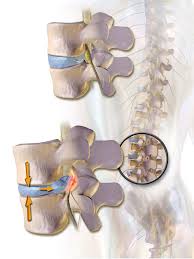Degenerative Disc Disease or Degenerative Disc Disorder is a medical condition where one or more than one intervertebral discs of the spine start degenerating.
This condition is extremely uncomfortable with the patient suffering from acute spinal and neck pain which in turn has a very negative effect on the normal life of the patient.
This medical condition is also termed as a disease of aging. A proper degenerative disc diagnosis is required because in a majority of cases DDD can cause severe chronic pain if left untreated.
Degenerative Disc Disease Symptoms
DDD symptoms include:
- Chronic low back pain that my trickle down to the hips
- Pain in thighs and buttocks while walking
- Tingling sensation and a feeling of weakness in fingers, hands and knees
- Pain that may feel like electric shock while bending, sitting, twisting and lifting
- Neck pain that may later spread to shoulders arms and hands
Degenerative Disc Disease Diagnosis
DDD diagnosis is often done with the help of physical examination and imaging tests that include x-rays, MRI or magnetic resonance imaging, and CT scan or computerized tomography scan.
Degenerative Disc Disease Treatment
DDD treatment consists of both surgical and non-surgical options. Usually doctors prefer non-surgical treatment options to successfully treat this problem.
Non-surgical treatment options for DDD include:
- Physical Therapy
- Chiropractic Therapy
- CMT or chiropractic manipulative therapy
- Osteopathic manipulations
Surgical treatment options include:
-
- Anterior cervical discectomyand fusion
- Cervical corpectomy
- Dynamic Stabilisation
- Facetectomy:
- Foraminotomy
- Intervertebral disc annuloplasty (IDET)
- Intervertebral disc arthroplasty
- Laminoplasty
- Laminotomy
- Microdiscectomy
- Percutaneous disc decompression
- Percutaneous Laser Disc-Decompression (PLDD)
- Spinal decompression
- Spinal laminectomy
Apart from these treatment options, anti-inflammatory medications like such NASIDs or no steroidal anti-inflammatory, traction, or spinal injections are used as a way to help patient get some respite from their uncomfortable condition.



